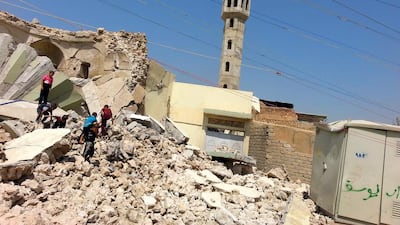The extent to which communities in Syria and Iraq that have fallen under ISIL’s influence have changed since the group took control might take a generation to fully comprehend. In much of the expanse that ISIL has controlled or still holds, social change was historically slow due to their remoteness from centres of power. Whether under the Ottomans or the Baathists, whether they practised Salafism or Islamism, change in these hinterland areas was mostly limited and scattered.
When ISIL came, it emphasised managing all aspects of people’s lives. It brought with it a radical project to erase and eradicate social bonds and religious norms.
Will Sufism, for example, survive the vicious systematic campaign by ISIL to uproot it?
Historically, Sufi orders prevailed in the region that stretches from Fallujah to the Iraqi and Syrian Kurdish areas all the way to Aleppo. Much of this expanse subscribes to the Naqashbani Sufi order, followed by the Qaderiyah order. Despite the social conservatism prevalent in these areas, attempts over the past century to spread Salafism there largely failed.
For ISIL, which represents the opposite extreme of the spectrum, to have followers in this region – or at least people it has been able to control it with relative ease – should be regarded as damning evidence that the governments that formally ruled these areas have done a bad job.
Sufis have been at the forefront of ISIL’s targets. Sufi imams at mosques were replaced by clerics who preach anti-Sufi messages. Sufi shrines were quickly destroyed in every village or town controlled by ISIL. Some Sufi clerics were punished or killed after the militants accused them of practising sorcery. The majority of Sufis in the region either fled or converted to ISIL’s religious doctrine.
The Kurdish Al Khaznawi family follows a Sufi order in northeastern Syria. Before ISIL ruled the area, thousands of people would travel from across eastern Syria to embrace the order.
“Sufism stands to the opposite of ISIL,” said Dr Murshid Al Khaznawi, a Kurdish political leader. “In its emotional and religious teachings, Sufism emphasises that Wahhabism, or Salafism, moves away from spirituality and expressing love to the Prophet and saints. Sufi clerics played on this factor for a long time.”
He said Sufi teachings safeguarded many people from embracing ISIL. Among the Kurds, he said, another segment of society had gravitated towards secular political parties that kept young people away from “religious debates” altogether. When ISIL took control of the area, however, a large number of people joined it.
“I remember, for example, when ISIL attacked Tal Marouf, burnt the mosque and destroyed the Khaznawi shrines. Many of those who were present at these scenes were surprised to see some old disciples of the Khaznawi sheikhs. When they came with ISIL, they were familiar with the little details, the streets and the houses.”
Mr Al Khaznawi cites two reasons for people turning against the Sufi clergy. First, the clerics did not support the peaceful movement against the Syrian regime in 2011. As with the tribal chiefs, they stood by president Bashar Al Assad. Also, many clerics did not show leadership at that time and instead looked after their own interests.
So, the collapse of Sufi clerical authority in the public eye added to the problems caused by the systematic war that ISIL waged against Sufism and Sufi teachings in the region.
The organised effort by ISIL to indoctrinate the population living under its control against Sufism might have a lasting effect even if people do not fully embrace the new ideology.
Takfiri (excommunication) concepts began to gain traction elsewhere in Syria, even where ISIL does not have a presence. Such a trend might include suspicion against practices some extremists deem to be un-Islamic, such as the building of shrines for religious saints or even celebrating the birthday of the Prophet Mohammed. There are already indications that at least some “awareness” of such practices has been created as a result of the rise of extremist forces in the country.
Even when ISIL is dismantled, communities that it ruled will have deep bruises to deal with for many years to come. In addition to the broken ties and the psychological scars, it is worth considering the cultural and religious transformation that this region may have experienced over more than two years.
The public demise of Sufism in that region, for now, is one example of many unexplored effects of ISIL’s rule. It is possible that Sufism will once again thrive after the defeat of ISIL. But the odds are that some aspects of ISIL’s cleansing campaign will survive its defeat.
Hassan Hassan is a resident fellow at the Tahrir Institute for Middle East Policy and co-author of ISIS: Inside the Army of Terror
On Twitter: @hxhassan

